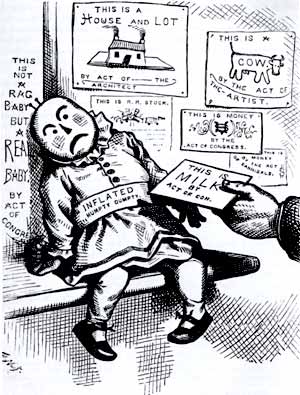|
|
Scholars In Action presents case studies that demonstrate
how scholars interpret different kinds
of historical evidence. This cartoon, "Milk Tickets for Babies, in Place of Milk,"
created by Thomas Nast in 1876,
comments on one debate that raged in the years following the Civil War:
should the currency of the United States be based on gold (the "gold
standard") or on paper (known as "greenbacks")? These debates
about the nature of money, and the meaning of value itself, coincided
with equally fundamental social and political debates about the nature
of citizenship as it applied to the newly emancipated slaves. Political
cartoons were a major form of commentary in late nineteenth-century American
life, and Thomas Nast (1840-1902) was the most famous cartoonist of his
day.
Before you move to the next page examine this cartoon
yourself. What do you see in it? What do you think Nast was trying to
say? What elements of the cartoon confuse you?
Published online July 2002. Cite as: Michael O'Malley, "Analyzing Political Cartoons," History Matters: The U.S. Survey Course on the Web,
http://historymatters.gmu.edu/mse/sia/cartoon.htm, July 2002. |
|


